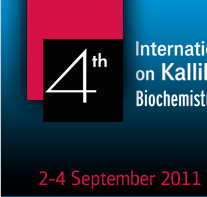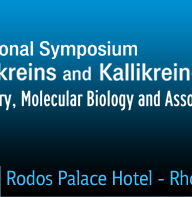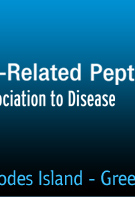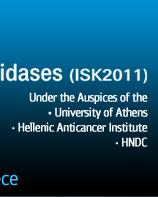|
|
 |
|
Friday, September 2, 2011
|
| 07.30-09.00 |
Registration |
| 09.00-09.15 |
Opening
Ceremony - Welcome Addresses
Andreas Scorilas, University of
Athens, Athens, Greece and
Eleftherios P. Diamandis,
University of Toronto, Toronto,
Canada.
Representatives from University of
Athens, Greek Society of Clinical
Chemistry - Clinical Biochemistry,
Hellenic Anticancer Institute and
HNDC. |
| 09.15-09.30 |
The E.K. Frey - E.
Werle Foundation Awarding of the
E.K. Frey - E. Werle Promotion
Prize
(Prof. Dr. Hans Fritz) |
| 09.30-10.00 |
Biochemical
and cell biological
characterization of
kallikrein-related peptidases.
Victor MAGDOLEN:
Technical University of Munich,
Munich, Germany. |
| 10.00-10.30 |
Coffee break and
poster viewing |
| 10.30-12.00 |
Session I
Biochemistry and Structural
Aspects of Tissue Kallikrein and
Kallikrein-Related Peptidases
(KLKs).
(Coordinators: J. Clements and
G. Sotiropoulou) |
| 10.30-10.55 |
Structural
basis of kallikrein-related
peptidase regulation by
stimulators and inhibitors.
Peter GOETTIG:
University of Salzburg, Salzburg,
Austria. |
| 10.55-11.20 |
Functional
intersection of matrix
metalloproteases with
kallikrein-related peptidases
Michael BLABER:
Department of Biomedical Sciences,
Florida State University,
Tallahassee, Florida, USA. |
| 11.20-11.30 |
OP01:
Crystal structure of cancer
related subforms of PSA (human
kallikrein-related peptidase 3)
in an Fab sandwich complex.
E.A. Stura:
SIMOPRO/CEA, France. |
| 11.30-11.40 |
OP02: Crystal
structural analysis of human
kallikrein-related petidase 4 -
inhibitor complexes.
O.V. Ilyichova:
Department of Biochemistry and
Molecular Biology, Monash
University, Melbourne, VIC, Australia. |
| 11.40-11.50 |
OP03: Imaging
cancer-associated proteases and
their receptors in vivo using
recombinant human antibodies.
A.M.
LeBeau: Department of
Pharmaceutical Chemistry,
University of California, San
Francisco, USA. |
| 11.50-12.00 |
OP04: Enzymatic
activity of PSA is not required
for its biological activities.
K.
Chadha: Department of
Molecular & Cellular Biology,
Roswell Park Cancer Institute, USA. |
| 12.00-12.30 |
Coffee break and
poster viewing |
| 12.30-14.00 |
Session
II
KLKs and
proteinase-mediated signaling:
Structure and Enzyme Activity
Meets KLKs Physiology.
(Coordinators: M.
Hollenberg, P. Goettig) |
| 12.30-12.55 |
Proteinase-mediated
signaling and inflammation: KLKs
and more.
Morley
HOLLENBERG:
University of Calgary, Calgary,
Canada. |
| 12.55-13.20 |
Activation of
cell surface receptor systems by
proteolytic cascades involving
kallikreins and other serine
proteases.
John
HOOPER:
Mater Medical Research Institute,
South Brisbane, Australia. |
| 13.20-13.30 |
OP05: Palmitoylation
regulates protease-activated
receptor 2 signalling.
M.N.
Adams:
Mater Medical Research Institute,
QLD, Australia. |
| 13.30-13.45 |
OP06: Kallikrein-related
peptidase 4 cleaves the Ephb4
tyrosine kinase receptor and its
ligand, ephrinb2, to regulate
epithelial cancer progression.
A.C.
Herington: Institute of
Health & Biomedical
Innovation, Queensland University
of Technology, Brisbane, Australia. |
| 13.45-14.00 |
OP07: Kallikrein-related
peptidases as modulators of the
innate immune response.
K.
Oikonomopoulou: Department of
Pathology & Laboratory
Medicine, University of
Pennsylvania, School of Medicine,
Philadelphia, USA. |
| 14:00-16:00 |
Break |
| 16.00-17.30 |
Session
III
KLKs and Skin
Pathophysiology
(Coordinator: E.P.
Diamandis) |
| 16.00-16.25 |
Allergy by
deregulation of epidermal
proteases: new insights from
Netherton syndrome.
Alain
HOVNANIAN:
Departments of Genetics and
Dermatology, INSERM U781,
Université Paris V René Descartes,
France. |
| 16.25-16.50 |
Kallikrein
activity and function and human
epidermis: recent updates and
clinical implications for
inflammatory skin diseases.
Azza
EISSA:
University of Toronto, Canada |
| 16.50-17.00 |
OP08: Mutational
analysis of SPINK9.
M.
Brattsand: Department of
Public Health and Clinical
Medicine, Dermatology and
Venereology, Umeå University, Sweden. |
| 17.00-17.10 |
OP09: Transglutamination
of SPINK6: cross-linked
regulation of protease activity
in the epidermis.
U.
Meyer-Hoffert: Department of
Dermatology, University Hospital
Schleswig-Holstein, Kiel, Germany. |
| 17.10-17.20 |
OP10: Novel
organic kallikrein-related
peptidase 5 inhibitors
identified by virtual and in
vitro screening.
X. Tan: Groupe
d’Enzymologie Moléculaire et
Fonctionnelle, UR4, Université
Pierre et Marie Curie, Sorbonne
Universités, Paris, France. |
| 17.20-17.30 |
OP11: Unravelling
epidermal protease cascades:
targeted inhibition of KLK14.
S.J. De
Veer:
Institute of Health and Biomedical
Innovation, Queensland University
of Technology, Brisbane, Australia. |
| 17.30-19.30 |
Poster Session
|
Welcome Reception
cocktail
|
| Free night |
|
Saturday, September 3,
2011
|
| 09.15-10.45 |
Session
IV
Functional Aspects of the
Kallikrein-Kinin System and KLKs
(Coordinators: H. Fritz and J.
Clements) |
| 09.15-09.40 |
Kallikrein
(K1) and kinins in
cardiovascular and renal
diseases.
François
ALHENC-GELAS:
French National Institute of
Health and Medical Research
(INSERM), Paris, France. |
| 09.40-10.05 |
Immunopathophysiological
roles of Kallikreins in CNS
inflammatory diseases.
Isobel
SCARISBRICK:
Mayo Medical and Graduate School,
Rochester, Minnesota, USA. |
| 10.05-10.15 |
OP12: Intestinal
tissue kallikrein - kinin system
in inflammatory bowel disease.
A.
Stadnicki: Department of
Basis Biomedical Sciences, Medical
University of Silesia, Katowice, Poland. |
| 10.15-10.30 |
OP13: Is human
kallikrein related peptidase 12
(KLK12), a novel kininogenase?
T.
Kryza:
INSERM, U618, Faculté de Médecine,
Université F. Rabelais, Tours, France. |
| 10.30-10.45 |
OP14: The delay of
oligodendrocyte development and
myelination in KLK6 deficient
mouse.
K.
Murakami: Department of
Functional Anatomy and
Neuroscience, Asahikawa Medical
University. |
| 10.45-11.15 |
Coffee break and
poster viewing |
| 11.15-13.30 |
Session
V
Gene Regulation of KLKs -
miRNAs, SNPs, Methylation
(Coordinators: G. Yousef
and B. Bapat) |
| 11.15-11.40 |
ThemiRNA
regulation of Kallikreins: There
is a whole new world out there.
George
YOUSEF:
St. Michael’s Hospital and
University of Toronto, Toronto, Canada. |
| 11.40-12.05 |
Prediction of
prostate cancer risk based on
single-nucleotide
polymorphism(s) compared to PSA
in large, prospective, and
highly representative
population-based cohorts of
unscreened men.
Hans
LILJA:
Memorial Sloan-Kettering Cancer
Center, New York, USA. |
| 12.05-12.30 |
Epigenetic
regulation of KLK locus:
Implications for prostate
cancer.
Bharati
BAPAT:
Samuel Lunenfeld Research
Institute, Mount Sinai Hospital
and University of Toronto,
Toronto, Canada. |
| 12.30-12.40 |
OP15: The
microRNA-kallikrein axis of
interaction: a new dimension in
the pathogenesis of prostate
cancer.
N.A.M.
White:
Department of Laboratory Medicine
and the Keenan Research Centre in
the Li Ka Shing Knowledge
Institute St. Michael’s Hospital,
Toronto, Ontario, Canada. |
| 12.40-12.50 |
OP16:
Study of KLK4, KLK5 and KLK14 mRNA
levels in breast cancer cells
after treatment with
antineoplastic agents.
G.
Papachristopoulou:
Department of Biochemistry and
Molecular Biology, University of
Athens and Saint Savvas” Anticancer
Hospital Athens, Greece. |
| 12.50-13.00 |
OP17: Differential
expression of kallikrein genes
in normal and cancerous tissues.
A.
Dimitromanolakis: Department of
Laboratory Medicine and
Pathobiology, University of
Toronto and Mount Sinai Hospital,
Toronto, Canada. |
| 13.00-13.15 |
OP18: Quantitative
analysis and study of the
microRNA 224 (miR-224) and its
target, KLK15 gene, in prostate
tumors: investigation of their
clinical significance.
K.
Mavridis: Department of
Biochemistry and Molecular
Biology, University of Athens,
Panepistimiopolis, Athens, Greece. |
| 13.15-13.30 |
OP19:
Biochemical pathways underlying
breast cancer suppression by KLK5.
G. Pampalakis:
Department of Pharmacy, University
of Patras, Rion-Patras, Greece. |
| 13.30-15.30 |
Break |
| 15.30-17.10 |
Session
VI
KLKs as Cancer Biomarkers
(Coordinators: M. Schmitt
and L. Talieri) |
| 15.30-15.55 |
Understanding
the role of Kallikrein Related
Peptidases in prostate and
ovarian cancer: Use of novel
biomimetic models and a systems
biology approach.
Judith
CLEMENTS: Queensland
University of Technology,
Brisbane, Australia. |
| 15.55-16.20 |
Kallikrein
Related Peptidases as Cancer
Biomarkers: an update 2011.
Manfred
SCHMITT: Technical
University of Munich, Germany. |
| 16.20-16.30 |
OP20: Gene
expression profiling of ovarian
cancer biomarkers with emphasis
on the KLK Family.
V.
Milou:
Department of Laboratory Medicine
and Pathobiology, University of
Toronto and Mount Sinai Hospital,
Toronto, Canada. |
| 16.30-16.40 |
OP21: Stromal
cell-associated expression of
KLK6 indicates poor prognosis of
ovarian cancer patients.
L.
Seiz:
Klinische Forschergruppe der
Frauenklinik der Technischen
Universität München, Germany. |
| 16.40-16.50 |
OP22: Quantification
of the expression of
kallikrein-related peptidase 11
gene (KLK11) reveals its
downregulation in bladder cancer
patients.
M.
Avgeris: Department of
Biochemistry and Molecular
Biology, University of Athens,
Panepistimiopolis, Athens, Greece. |
| 16.50-17.00 |
OP23: Separation of
KLK6 glycoprotein subpopulations
in biological fluids by an
ELISA-coupled anion exchange
method.
U.
Kuzmanov: Department of
Pathology and Laboratory Medicine,
Mount Sinai Hospital and
Department of Laboratory Medicine
and Pathobiology, University of
Toronto, Toronto, Canada. |
| 17.00-17.10 |
OP24: KLK4 mRNA
expression in colon cancer: A
novel biomarker with significant
prognostic value.
C.K. Kontos: Department of
Biochemistry and Molecular
Biology, University of Athens,
Athens, Greece. |
| 18.30 |
City Tour to the
Medieval city of Rhodes &
Dinner |
| Sunday,
September 4, 2011 |
| 09.00-11.00 |
Session
VII
KLK Inhibitors, Activators
and Downstream Targets
(Coordinator: V. Magdolen
and O. Schilling) |
| 09.00-09.25 |
Proteomic
approaches to understanding
cellular proteolysis.
Oliver
SCHILLING: University of
Freiburg, Freiburg, Germany. |
| 09.25-09.50 |
Rational
design of KLK inhibitors.
Jon
HARRIS: Queensland
University of Technology,
Brisbane, Australia. |
| 09.50-10.05 |
OP25: DM107, an
inhibitor of kallikrein cascade,
to treat skin disorders such as
Netheton Syndrome and Atopic
Dermaditis.
D.
Deperthes: Dermadis SAS,
Biopark, Archamps, France. |
| 10.05-10.20 |
OP26: Engineered
serine protease inhibitor
MDPK67b to treat asymptomatic
hormone refractory prostate
cancer patients with rising PSA.
C.
Kündig: Med Discovery SA,
World Trade Center II, Geneva, Switzerland. |
| 10.20-10.30 |
OP27: Improvement
of peptides modulating activity
of KLK2 and KLK3 for targeting
prostate cancer.
C.
Hekim:
Department of Clinical Chemistry,
University of Helsinki, Helsinki,
Finland. |
| 10.30-10.40 |
OP28: Characterization
of protein substrates of KLK3:
effect of KLK3 stimulating
peptides.
H.
Koistinen: Department of
Clinical Chemistry, University of
Helsinki and Helsinki University
Central Hospital, Finland. |
| 10.40-10.50 |
OP29: Contextual
mapping of kallikrein-related
peptidase 4 substrates in
prostate cancer.
R.
Fuhrman-Luck: Institute of
Health and Biomedical Innovation,
Queensland University of
Technology, Brisbane, Queensland,
Australia. |
| 10.50-11.00 |
OP30: Role of
kallikrein-related peptidases 4
and 14 signalling through
proteinase-activated receptors
in colonic cancer cells.
D.
Darmoul: Centre de
Recherche Biomédicale
Bichat-Beaujon (CRB3), INSERM 773,
Faculté de Médecine Xavier Bichat,
France. |
| 11.00-11.30 |
Coffee break and
poster viewing |
| 11.30-12.00 |
ISK
General Meeting
(Moderators: E. P.
Diamandis and A. Scorilas) |
| 12.00-13.30 |
Session
VIII
The Future of Kallikreins
(Coordinators: M. Blaber
and E.P. Diamandis) |
Roundtable
discussion
M. Blaber, B. Bapat, J.
Clements, E.P. Diamandis, H.
Fritz, P. Goettig, M.
Hollenberg, V. Magdolen,
O.Schilling, M. Schmitt, A.
Scorilas, G. Sotiropoulou, L.
Talieri, G. Yousef. |
| 13.30-13.45 |
Young
Investigator’s Awards - Poster
Prizes |
| 13.45-14.00 |
Concluding Remarks
- Closing Ceremony |
|
|
|




